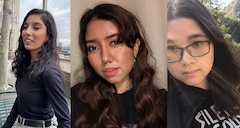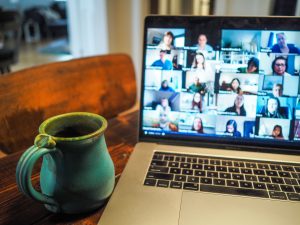
When Manahil Jafri discovered her freshman year at Hunter College would be online, she became frustrated and disappointed. Jafri spent the last half of her senior year of high school learning virtually at home and was craving independence from her strict and sometimes overbearing parents that college was supposed to bring. She longed for the new friendships that come along with starting the next phase of her life.
But Hunter’s campus closure didn’t stop Jafri, a political science and economics major, from getting involved in the school’s community. Last summer, Jafri researched different Hunter clubs that interested her. She introduced herself on the “Hunter Class of 2024” Instagram page, dedicated to Hunter College freshmen getting to know each other.
After Jafri posted, other students with similar interests or majors started reaching out to her. “Eventually, we all made a bigger group chat (on WhatsApp) and I made some great friends through that.” What started as a chat for a couple of people now has almost 200 members.
Jafri isn’t the only student to turn to social media to make friends. Sixty percent of teens said they made and spent time with friends using social media before the coronavirus, according to Amanda Lenhart in a Pew Research Center study. Eighty-one percent said social media makes them feel more connected to their friends’ lives. This trend is more critical for Hunter students now than ever since losing their in-person option to meet new people.
“It’s important to realize that friends can have academic as well as social benefits,” said Dartmouth College researcher Jane McCabe. She conducted a study on the effects of college friendships at a large midwestern public university.
McCabe found that all of the 67 undergraduate students who reported that their close groups of friends provided academic motivation and support graduated. Strong friendships “can be ties to keeping students committed,” she said, “and helping them do well and helping them feel like a whole person too.”

Jafri said her friends have helped her out academically. Many give her advice for her major and suggest courses to take. “Also, having friends in your classes is useful to tell your professor if you’re stuck in the waiting room,” she said.
Going into the fall semester, freshman Victoria Moraid-Perez was hoping to attend some of her classes in-person. It wasn’t until she received her final schedule that she realized her courses were all online. Moraid-Perez, a biology major, also decided to check-out the “Hunter Class of 2024” Instagram page hoping to meet new people before school started. She, like many others, posted a picture and a short description of herself to the group.
“I got a lot of followers and people who dm me saying, ‘oh, I’m interested in biology too.’ So, I made a couple of friends that way,” Moraid-Perez said.
When classes started, Moraid-Perez recognized some of her classmates from the Instagram page. One day, she asked those students during a breakout room to create a group chat. Now, Moraid-Perez and that group of people are friends. They frequently study together, take group quizzes together and Facetime for fun.

Not all incoming Hunter College students quickly made friends and got involved. When Pierce Jau Hunter, 24, a history major, transferred to Hunter last fall, she didn’t feel a part of the community that has more than 17,000 undergraduate students.
“I barely made any relationships during my first semester,” Hunter said. “I felt very alone and helpless. It definitely added onto my anxiety.”
Hunter doesn’t remember seeing any promotions for clubs or events to get involved in her first semester, making it harder for her to meet people virtually. “But this semester, they promoted a lot and now I’m part of like four of five clubs,” she said.
Hunter is the vice-president of the Circle K International Club, the Taiwanese Student Association’s intercommunications chair, and a member of Mock Trial, Moot Court, Business Student Association and Forte.
“I’m very close with my members and it’s been very fun to be part of these clubs,” Hunter said. “And for us, it was much easier, I guess, to find our place.”
Hunter and her friends use chat apps and discords to communicate. They help motivate each other to study and get homework done. Hunter’s “100,000% confident” that her friends and herself will continue to stay close once school starts up in-person again.
Jafri, who experienced bullying as a child, understands that you have to actively take the lead if you want to make friends and get involved.
“I’m the one who created a lot of the group chats. I made the Instagram page,” Jafri said. “If I didn’t take the initiative, I don’t know if I would really be as involved or know as many people as I currently do.”
